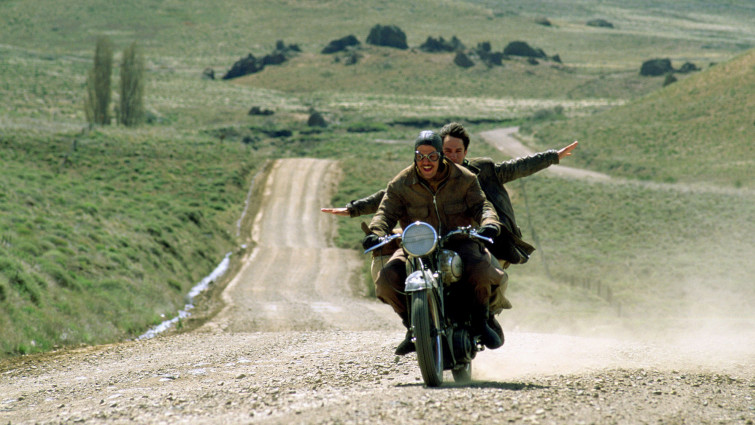

Member review

Diarios De Motocicleta (The...
Road movie based on the diaries of a young Che Guevara traveling through Argentina with his friend Alberto Granado.
Certificate
Duration121 mins
Review by
- Barnie, 17
- 11 reviews
Review by Barnie, 17
Ernesto 'Che' Guevara (or 'Fuser' as this film dubs him) has always been a controversial figure- immortalised thanks to a famous line drawing that has spawned more T-shirts than the sea has fish, to some he is an inspiring figure of a revolution against 'the man', and to others a mad communist whose sole achievement was the foundation of one corrupt, generally rubbish government (that of Cuba). Personally, I've never had much of an opinion, having never had an opportunity to study the man, but this film was always going to tread a dangerous line by referring to the subject matter that directly formulated Guevara's political philosophy. The Iron Lady sidestepped a similar problem by attempting to take no political stance whatsoever and ignoring everything that actually happened under her, resulting in a film in which nothing happens and critics hated (Meryl Streep's performance excepted). The Motorcycle Diaries tries a different tack, simply laying out events, including encounters with extreme poverty, lepers and indigenous history, as they happened and demonstrating their meaning to Guevara thanks to profound changes in his character. A mostly aimless, almost blank slate of a character is presented to us at the film's opening, devoid of any context of characterisation beyond a short opening montage, and the audience are invited to join his journey of discovery through wherever in South America his battered motorcycle can drag him and a friend. And it pulls it off superbly- by making the audience feel, rather than just see, the events' impact, they are given a profound insight into the motivations of a philosophy born out of a profound sense of right and wrong, and a desire to do something about it. This is a coming-of-age film in the true sense of the phrase, a half-empty child's mind visibly sculpting itself into that of a man. But, it doesn't just try to force home a message- the very reason it works is because it is made to feel real, and as such endlessly compelling to watch. Guevara's friend and partner on his epic voyage Alberto Granado (Rodrigo de la Serna) serves not as a token character thrown in for the sake of accuracy, but provides much-appreciated and surprisingly appropriate comic relief throughout, making the film seem genuinely alive and real. Director Walter Salles could have been forgiven for just trying to make his point in 100 minutes, keeping it a clean, safe, formulaic description and clocking off early, but he instead elects to let it run its course- it is exactly as long as it needs to be to work properly and to feel right, there are no concessions made for the sake of the Hollywood age ratings, and the emphasis is placed less on the events and more on the feelings and sensations they inspire. He also shows an inspired grasp of how to effectively convey character development and meaning- rather than explicitly tell the audience exactly what his point is (something The Dark Knight Rises did to its detriment), he trusts to their intelligence and subtly alludes to Guevara's character traits through his actions and behaviour. In one, seemingly irrelevant sequence, Guevara elects to tell his benefactor exactly what he thinks of his novel, rather than simply flattering to him as Granado did: this serves no purpose in advancing the plot, but shows us the kind of brutal honesty, conscience and refusal to pander that Guevara's trip has given him. Gael Garcia Bernal performs the hell out of the role, the tiniest variations in his facial expression telling us more than ten minutes of exposition could. In fact, there is only one moment of what could be called exposition proper in the entire film, occurring right at the end to let his political philosophy shine as clear to the audience as his moral one has been throughout. This is not just a tale, a story, a sequence of events- it is, in many respects, nothing short of poetry. A film about two guys on a long motorbike journey should make you bored; one about Che Guevara should get your hackles up. The Motorcycle Diaries does neither- it simply makes us understand.